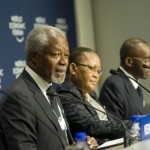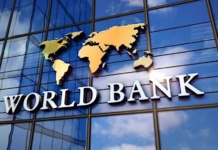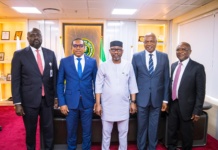
Africa is standing on the edge of enormous opportunity, this year’s Africa Progress Report finds, and African policy makers have critical choices to make. They can either invest their natural resource revenue in people to generate jobs and opportunities for millions in present and future generations. Or they can squander this opportunity, allowing jobless growth and inequality to take root.
In many African countries, natural resource revenues are widening the gap between rich and poor. Although much has been achieved, a decade of highly impressive growth has not brought comparable improvements in health, education and nutrition.
The Africa Progress Panel is convinced that Africa can better manage its vast natural resource wealth to improve the lives of the region’s people by setting out bold national agendas for strengthening transparency and accountability.
However, international tax avoidance and evasion, corruption, and weak governance represent major challenges. The report therefore welcomes the commitment from the current G8 presidency, the United Kingdom, and other governments to put tax and transparency at the heart of this year’s dialogue. It urges all OECD countries to recognize the cost of inaction in this vital area. Africa loses twice as much in illicit financial outflows as it receives in international aid. The Africa Progress Panel finds it unconscionable that some companies, often supported by dishonest officials, are using unethical tax avoidance, transfer pricing and anonymous company ownership to maximize their profits, while millions of Africans go without adequate nutrition, health and education.
The report details five deals between 2010 and 2012, which cost the Democratic Republic of the Congo over US$1.3 billion in revenues through the undervaluation of assets and sale to foreign investors. This sum represents twice the annual health and education budgets of a country with one of the worst child mortality rates in the world and seven million pupils out of school.
Kofi Annan, former Secretary-General of the United Nations and Chair of the Africa Progress Panel, says: “Tax avoidance and evasion are global issues that affect us all. The impact for G8 governments is a loss of revenue. But in Africa, it has direct impact on the lives of mothers and children. Throughout the world, millions of citizens now need their leaders to step up to the mark and lead. Fortunately, momentum for change appears to be accelerating.”
Different partners have similar goals and their interests overlap, the report finds. Building trust is harder than changing policies, yet it is the ultimate condition for successful policy reform. This year’s report identifies a shared agenda for change:
• African governments must improve their governance and strengthen national capacity to manage extractive industries as part of a broader economic and developmental strategy
• African governments should put transparency and accountability at the heart of natural resource policies, secure a fair share of natural resource revenue for their citizens, and spread the benefits of this revenue via equitable public spending;
• The international community should build on the US Dodd-Frank Act and comparable EU legislation to develop a global standard for transparency and disclosure, develop a credible and effective multilateral response to tax evasion and avoidance, and tackle money laundering and anonymous shell companies;
• International business should follow best practices on transparency, help build national capacity, procure more products and services locally, and raise standards in all areas of corporate accountability and responsibility;
• Civil society should build capacity and continue to hold governments and companies to account.
Graça Machel, President of the Foundation for Community Development and Founder of the Graça Machel Trust and member of the Africa Progress Panel, says: “This report makes a critical contribution to debates on Africa’s natural resource wealth. If its recommendations are taken, Africa will accelerate progress towards the Millennium Development Goals. More kids will go to school, fewer women will die in child birth, more children will survive their childhood.”
Strive Masiyiwa, Chairman and Founder of Econet Wireless and member of the Africa Progress Panel says: “While some major companies show outstanding leadership on transparency, others show a disregard for ethics and human lives. By cheating the system, they make work harder for honest business.”
Linah Mohohlo, Governor of Botswana’s Central Bank and a member of the Africa Progress Panel, says: “Botswana’s key lesson has been that Africa’s natural resources belong to the people. In this way, diamonds became the country’s relative economic success.”
Chaired by Kofi Annan, former Secretary-General of the United Nations, the ten-member Africa Progress Panel advocates at the highest levels for equitable and sustainable development in Africa. The Panel releases its flagship publication, the Africa Progress Report, every year in May.










